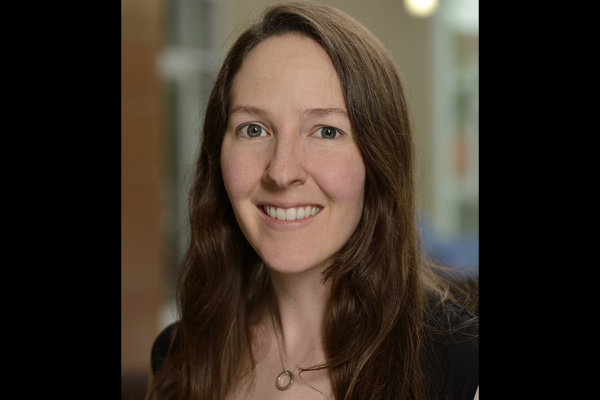“The two of you embody in some sense the incredible breadth of research that goes on at JHU,” said Ed Schlesinger, dean of the Whiting School of Engineering. “From the very smallest genetic materials that define what life is all about to the planets, space, the cosmos, and the search for life beyond our own world—there is something particularly poetic about the juxtaposition of both of [your work].”
During the presentation, both Battle and Hörst discussed the transformative impact the award would have on their research teams.
“Last night and today, I was thinking, What do I really want to do if I get this award? And I was really laying out some of the exciting things that I’m hoping will happen over the next few years,” Battle said. “So that makes me even more excited now, to know those things are going to be possible. I’m so thrilled, and I’m thrilled to see my students thrive even more.”
Battle is an internationally recognized leader in the field of biomedical engineering whose work has vital implications in the fields of human genetics, computational genomics, and precision medicine. Her research focuses on how genetic variation between individuals leads to changes in gene expression, and how these changes then lead to disease risk and progression. Using machine learning and probabilistic modeling, Battle and her lab create computational models capable of interpreting vast sets of genomics and health data to identify variations in gene expression and follow trends in disease progression caused by these changes in DNA. She has pioneered the use of time-series data to understand the impact of genetic variation at critical time points relevant to disease development.
Her breakthrough computational system, Watershed, holds great promise in the field of personalized genomics. Watershed’s advanced modeling system combines personal genetic data and diverse cellular measurements to improve predictions of which genetic sequence differences found in a specific individual will affect that person’s health. Applying this system across ancestries, families, and new data types has the potential to improve the diagnosis and treatment of rare diseases.
“There is increasing need for creative computational methods in genomics,” wrote Michael Miller, director of the Department of Biomedical Engineering, in a letter nominating Battle for the President’s Frontier Award. “…Seeing the full impact of genomic data on biological and medical research therefore relies on the type of creative and careful methods development Alexis does.”
Battle was a senior leader on the GTEx Consortium Project, a massive multi-institution effort that collected and analyzed thousands of human tissue samples to better understand gene expression. With dozens of principal investigators on studies related to the project, Battle’s lab played a central role and she served as a senior author on the project’s flagship papers.
Educated at Stanford University, Battle received her BS in symbolics systems and her MS and PhD in computer science. She completed a postdoctoral research specialization in genetics at the Howard Hughes Medical Institute at Stanford. She joined the faculty at Johns Hopkins in 2014 after working as a staff software engineer and engineering manager at Google. She has previously won a Johns Hopkins Catalyst Award (2017), which recognizes early career researchers with a $75,000 grant for their research and creative endeavors, and a Johns Hopkins Discovery Award (2019), which provide grants to cross-divisional teams. She was named a 2016 Searle Scholar and received a 2019 Microsoft Investigator Fellowship. She currently mentors four postdoctoral fellows, one medical fellow, 11 PhD students, and serves as an adviser for three undergraduates in the Department of Biomedical Engineering.

